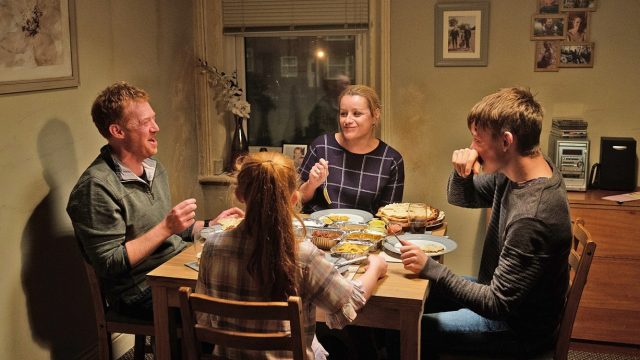Ken Loach’s Sorry We Missed You is both excellent and hard to recommend. It’s a heartfelt, human, and thoughtful look at how the gig economy is destroying us, and it doesn’t hold out much hope for either social change or emotional and spiritual survival on the lower rungs. How often are you in the mood to watch an ordinary, likable family slowly disintegrate in an inhuman pressure cooker? I like hard, desperate slogs and tragic, searing denunciations of contemporary society as much as the next film fan, but somehow this one, beautifully done though it was, was too much for me. It’s shot through with so much humanity that I genuinely hate to believe that it tips over into misery porn, but as I try to sum it all up, even to myself, that’s what I’m left with.
Ricky Turner (Kris Hitchen) has turned his hand to just about everything over the years, and now he’s signing on as a delivery driver. He tries to pitch it as him becoming his own boss, but there are no advantages to being an “independent contractor” at the cutthroat distribution center run by Maloney (Ross Brewster). If he doesn’t buy his own van–spending more money than he can afford, selling his wife’s own much-needed car to make the initial payment–then he can rent one from the company … but only at a steep price. His hours are grueling and beyond his control. If he can’t find his own replacement for a day off, he’s not only out a day’s pay, he’s fined, sanctioned, and berated. Better not have a family emergency. You’re not a person, you’re a cog in a machine, and if you forget that, you’re a blight on Maloney’s day, so he’ll do his best to be a blight on yours. Ricky is “independent” in the sense that the company has no responsibilities to him; they still want his whole life in return.
Abby (Debbie Honeywood), Ricky’s wife, has an equally grueling job as a carer. Her work is exhausting and sometimes horribly dispiriting–one session, which we thankfully don’t see, involves her having to clean up a seemingly endless amount of human shit while she’s simultaneously being clawed by a frantic, horribly confused old woman–but it does have occasional real consolation. Abby is a warm, kind person who makes genuine connections with her clients whenever possible, and we see how much some of them appreciate and respect her. But she only gets paid by the visit, not by the hour. Her conscience demands that she treat each person as well as she can, seeing to all their needs, but her paycheck provides only an incentive to knock each appointment out as quickly as possible. Without her car, she’s now constantly waiting for the bus, which cuts into her time even further.
The Turners have two children–teenage Seb (Rhys Stone) and the younger Liza Jane (Katie Proctor). Liza Jane is adorable but vulnerable, fraying under everyone’s collective stress. Seb is going through a smart-mouthed, rebellious phase, skipping school and trying out the odd bit of shoplifting, but he’s a good, compassionate kid at heart; it’s a little wrenching how swiftly he drops his anger when he can see that his dad is really hurting. This is a caring family. It ought to be okay, but it isn’t. As the movie progresses, the characters get snappish and short-tempered and bitter, lashing out at each other as the only soft targets around. They eventually push back against that impulse, but not before they’ve crossed lines they never thought they would.
The acting is terrific, and it’s particularly incredible that this was Honeywood’s–the film’s big discovery–first professional role. The film has a sense of humor, and the family dynamics feel as lived-in and affectionate even as they eventually turn tragically volatile. But the mishaps don’t always feel like they emerge organically, especially towards the end. Once the movie marks something as incredibly expensive, you know it’s going to get destroyed–and that the Turners will be on the hook for it–but does that twist of the knife really have to sink into a freshly bruised and degraded side? Forget about asking whether or not these people can catch a break: can Ricky not even get brutally beaten without also having his own piss dumped on him?
I want the Turners to be okay, and the extent to which I feel genuinely wounded by the fact that they’re not speaks to the film’s power. Society is rigged against them, and that makes me exactly as furious as Sorry We Missed You hopes it will. I just wish the plot didn’t feel quite as rigged against them too. They feel real, and that means they deserve more than the well-oiled machine they’re stuck in–whether it belongs to Maloney or to Loach.
Sorry We Missed You is streaming on Kanopy.

